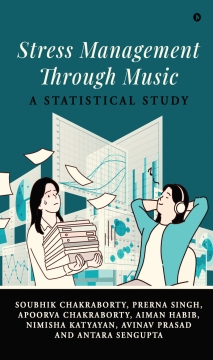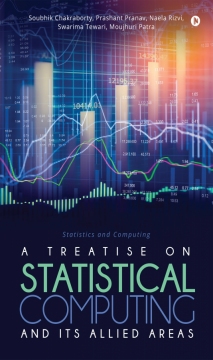
- Discover books
- For Writers
-
For Writers
-
Indie Author Championship
-
Challenges
Writing Contests
- Get Started

"It was a wonderful experience interacting with you and appreciate the way you have planned and executed the whole publication process within the agreed timelines.”
Subrat SaurabhAuthor of Kuch Woh Pal -
Soubhik Chakraborty, Prerna Singh, Apoorva Chakraborty, Aiman Habib, Nimisha Katyayan, Avinav Prasad and Antara Sengupta
Dr. Soubhik Chakraborty is currently serving as Professor and Head, Department of Mathematics, BIT Mesra, Ranchi, Jharkhand, India. He is the principal investigator in the project titled Hindustani Raga Analysis Using Statistical Musicology with Therapeutic Applications for Stress Management sponsored by IDEAS: Technology Innovation Hub @ Indian Statistical Institute, Kolkata. His research interests are algorithm analysis, music analysis and statistical computing. He has published several books, research monographs and papers in peer reviewed international and national journals besides successRead More...
Dr. Soubhik Chakraborty is currently serving as Professor and Head, Department of Mathematics, BIT Mesra, Ranchi, Jharkhand, India. He is the principal investigator in the project titled Hindustani Raga Analysis Using Statistical Musicology with Therapeutic Applications for Stress Management sponsored by IDEAS: Technology Innovation Hub @ Indian Statistical Institute, Kolkata. His research interests are algorithm analysis, music analysis and statistical computing. He has published several books, research monographs and papers in peer reviewed international and national journals besides successfully guiding 11 scholars leading to PhD. An acknowledged reviewer associated with ACM, IEEE and AMS, he has received several awards both in teaching and research. He has been a visiting scientist twice to Indian Statistical Institute (Bangalore Centre in 2002 and Kolkata Centre in 2004, the latter under fellowship of Indian National Science Academy). He is a life member of Indian Statistical institute and Acoustical Society of India.
Prerna Singh, an M.Sc. in Statistics, is currently a Project Fellow in the project detailed above and is working under the guidance of Prof. Soubhik Chakraborty. She has published four research papers and one article in a book jointly with her guide.
Apoorva Chakraborty is a Sangeet Visharad from Pracheen Kala Kendra, Chandigarh and a certified music therapist from NADA Centre for Music Therapy, India. She is currently a final year student of Psychology (Hons) at Nalanda Open University. Her contribution in Prof. Chakraborty’s project is related to data collection, assessment of stress, music intervention and measuring the efficacy of music in combating stress.
Aiman Habib has completed her M. Sc. in Mathematics from Department of Mathematics, BIT Mesra, Ranchi, India. Independently she has worked in Prof. Soubhik Chakraborty’s project and has published one paper with him.
Nimisha Katyayan has completed her Integrated M. Sc. in Mathematics and Computing from BIT Mesra, Ranchi. She worked temporarily as a Project Fellow in Prof. Soubhik Chakraborty’s project. Currently she is employed in Infosys as Technology Analyst.
Avinav Prasad is currently an 8th semester student of Integrated M. Sc. in Mathematics and Computing which he is doing from Department of Mathematics, BIT Mesra, Ranchi, India. His contribution has been in helping this research team in building a Music Therapy App. He has published one paper with this research team.
Dr. Antara Sengupta is an Assistant Professor, Department of Computer Application, Techno India Institute of Technology, West Bengal.India. She contributed the last chapter of this monograph besides helping this research team with her vocal recording on a Tagore song for statistical analysis. She has completed her PhD. in Computer Science from the University of Calcutta. Her research interests are Computational Genomics, Mathematical Biology, Graph Theory and Data Mining.
Read Less...Crop your profile image

Stress Management through Music
Books by Soubhik Chakraborty And Others
Scientists through their studies have revealed the healing powers of music in controlling blood pressure, negative emotions and stress. Statistics and probability have been used to analyse music successfully both in western and non-western (including Indian) music. In our study, the participants were divided into control group and case (music) group using randomized control trial. The case group participants, who were subjected to five music therapy sessions,
Scientists through their studies have revealed the healing powers of music in controlling blood pressure, negative emotions and stress. Statistics and probability have been used to analyse music successfully both in western and non-western (including Indian) music. In our study, the participants were divided into control group and case (music) group using randomized control trial. The case group participants, who were subjected to five music therapy sessions, responded better as compared to the control group participants as confirmed by statistical analysis. Perceived Stress Scale (PSS) was used for the assessment of stress. Hindustani music-classical, semi-classical and light-were effectively used in the music intervention. Further, some of the features of the music used in the work were also analysed statistically.
A Treatise on Statistical Computing and its Allied Areas
Books by Soubhik Chakraborty, Prashant Pranav, Naela Rizvi, Swarima Tewari, Moujhuri Patra
This is the first book in the Statistical Computing series which assembles a number of allied areas like neural networks, the Ramsey theory, integer factorisation, integer programming, and outliers. The book gives an in-depth coverage of randomness and random numbers, an essential tool for simulation studies.
The book is intended for postgraduates and researchers of statistics and computer science. It can also be used as
This is the first book in the Statistical Computing series which assembles a number of allied areas like neural networks, the Ramsey theory, integer factorisation, integer programming, and outliers. The book gives an in-depth coverage of randomness and random numbers, an essential tool for simulation studies.
The book is intended for postgraduates and researchers of statistics and computer science. It can also be used as reference material for advanced topics in statistical computing and allied areas.

Are you sure you want to close this?
You might lose all unsaved changes.
Select from one of our global stores to continue
 India
India
 Malaysia
Malaysia
 Singapore
Singapore
 UAE
UAE
Warning Message
The items in your Cart will be deleted, click ok to proceed.












